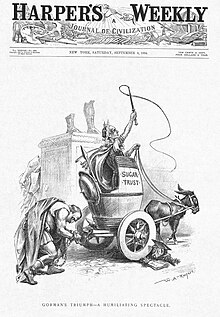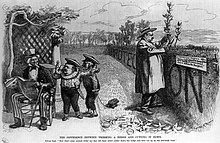Presidencies of Grover Cleveland
Cleveland won the 1884 election with the support of a reform-minded group of Republicans known as Mugwumps, and he expanded the number of government positions that were protected by the Pendleton Civil Service Reform Act.
[2] Cleveland, Thomas F. Bayard of Delaware, Allen G. Thurman of Ohio, Samuel Freeman Miller of Iowa, and Benjamin Butler of Massachusetts each had considerable followings entering the 1884 Democratic National Convention.
[2] Each of the other candidates had hindrances to his nomination: Bayard had spoken in favor of secession in 1861, making him unacceptable to Northerners; Butler, conversely, was reviled throughout the South for his actions during the Civil War; Thurman was generally well liked, but was growing old and infirm, and his views on the silver question were uncertain.
[4] He also benefited from the backing of state party leader Daniel Manning, who positioned Cleveland as the natural heir to Tilden and emphasized the importance of New York's electoral votes in any Democratic presidential victory.
[11] Reform-minded Republicans called "Mugwumps", including men such as Carl Schurz and Henry Ward Beecher, denounced Blaine as corrupt and flocked to Cleveland.
Despite this reluctance, after the Supreme Court's holding in the 1886 case of Wabash, St. Louis & Pacific Railway Co. v. Illinois severely limited the power of states to regulate interstate commerce, Cleveland assented to legislation providing for federal oversight of railroads.
Federal aid in such cases encourages the expectation of paternal care on the part of the government and weakens the sturdiness of our national character, while it prevents the indulgence among our people of that kindly sentiment and conduct which strengthens the bonds of a common brotherhood.
[46] Cleveland saw monetary policy as both an economic and moral issue; he thought that adherence to the gold standard would ensure a stable currency, and also felt that those who had extended loans should not be penalized by rising inflation.
[48] In reply, one of the foremost silverites, Richard P. Bland, introduced a bill in 1886 that would require the government to coin unlimited amounts of silver, inflating the then-deflating currency.
[65] Secretary of State Bayard negotiated with Joseph Chamberlain of Great Britain over fishing rights in the waters off Canada, and struck a conciliatory note, despite the opposition of New England's Republican senators.
In a subsequent conference that took place shortly after Cleveland left office, the United States, Germany, and Britain agreed to make Samoa a joint protectorate.
[74][75] The board's 1886 report recommended a massive $127 million construction program at 29 harbors and river estuaries, to include new breech-loading rifled guns, mortars, and naval minefields.
[82] Cleveland viewed Native Americans as wards of the state, saying in his first inaugural address that "[t]his guardianship involves, on our part, efforts for the improvement of their condition and enforcement of their rights.
[88][89] In the month before Cleveland's 1885 inauguration, President Arthur opened four million acres of Winnebago and Crow Creek Indian lands in the Dakota Territory to white settlement by executive order.
[110] As a supporter of greenbacks and Free Silver to inflate the currency and alleviate economic distress in the rural districts, Stevenson balanced the otherwise hard-money, gold-standard ticket headed by Cleveland.
One of the first clear signs of financial crisis came on February 20, 1893, twelve days prior to Cleveland's inauguration, when receivers were appointed for the Philadelphia and Reading Railroad, which had greatly overextended itself.
[128] Seeking to repeal the Sherman Silver Purchase Act and end the coinage of silver-based currency, Cleveland called a special session of Congress, to begin in August 1893.
In 1894, with the government in danger of being unable to meet its expenditures, Cleveland convinced a group led by financier J. P. Morgan to purchase sixty million dollars in U.S. bonds.
[144] This group, known as Coxey's Army, agitated in favor of a national roadbuilding program to give jobs to workingmen, and a bimetallist currency to help farmers pay their debts.
[154] Cleveland's actions would be upheld by the Supreme Court in the case of In re Debs, which sanctioned the president's right to intervene in labor disputes that affected interstate commerce.
[155] The outcome of the Pullman Strike, combined with the administration's weak anti-trust prosecution against the American Sugar Refining Company, made many believe that Cleveland was a tool of big business.
[171] The personal income tax included in the tariff was struck down by the Supreme Court in the 1895 case, Pollock v. Farmers' Loan & Trust Co.[172] In 1892, Cleveland had campaigned against the Lodge Bill,[174] which would have strengthened voting rights protections through the appointing of federal supervisors of congressional elections upon a petition from the citizens of any district.
"[186] Cleveland decided to restore the queen, but she refused to grant amnesty as a condition of her reinstatement, saying that she would either execute or banish the current government in Honolulu, and seize all of their properties.
[188] The Senate, under Democratic control but opposed to Cleveland, commissioned the Morgan Report, which contradicted Blount's findings and found the overthrow was a completely internal affair.
[190] Closer to home, Cleveland adopted a broad interpretation of the Monroe Doctrine that not only prohibited new European colonies, but also declared an American national interest in any matter of substance within the Western Hemisphere.
[198][199] In 1895–96 Secretary of the Navy Hilary A. Herbert, having recently adopted the aggressive naval strategy advocated by Captain Alfred Thayer Mahan, successfully proposed ordering five battleships (the Kearsarge and Illinois classes) and sixteen torpedo boats.
With the help of campaign manager Mark Hanna, McKinley had emerged as the front-runner for the nomination long before the convention by building the support of Republican leaders throughout the country.
Though Bryan had campaigned heavily in the Midwest, Democratic divisions and the traditional Republican strength in the area helped McKinley win a majority of the states in the region.
Denial of statehood was largely due to a concern that the lack of a northern transcontinental railroad connection would prevent effective governance, and a hesitation to disturb the delicate balance of Democrats and Republicans in the Senate.
Graff also notes that Cleveland helped establish Democratic dominance in the Solid South through policies of reconciliation, while at the same time revitalizing his party in the North by embracing civil service reform.




Front row, left to right: Thomas F. Bayard , Cleveland , Daniel Manning , Lucius Q. C. Lamar
Back row, left to right: William F. Vilas , William C. Whitney , William C. Endicott , Augustus H. Garland







Front row, left to right: Daniel S. Lamont , Richard Olney , Cleveland , John G. Carlisle , Judson Harmon
Back row, left to right: David R. Francis , William L. Wilson , Hilary A. Herbert , Julius S. Morton





